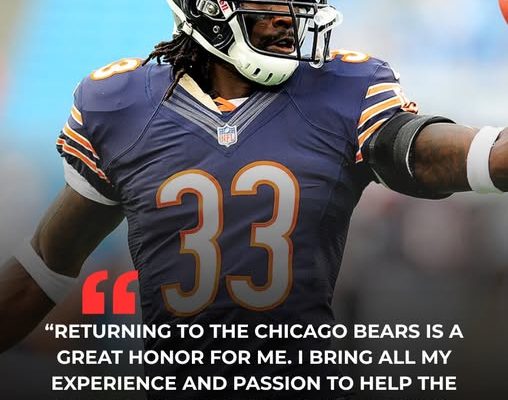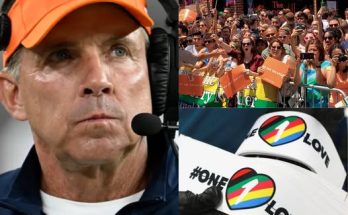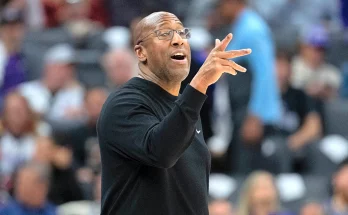The Chicago Bears have long been one of the most storied franchises in the NFL, and any time a potential shake-up occurs in the organization, it commands the attention of fans and analysts alike. In a move that has the entire NFL world buzzing, Bears Chairman George McCaskey has reportedly expressed interest in bringing back one of the franchise’s most beloved figures, Charles “Peanut” Tillman, to join the coaching staff as an assistant defensive coordinator. Tillman’s legendary status in Chicago is cemented not only by his on-field performance but also by his deep connection with the city and its football culture, making this potential reunion one of the most compelling stories in the league this offseason.
Tillman’s career with the Bears is the stuff of legend. Drafted in the second round of the 2003 NFL Draft out of the University of Louisiana at Lafayette, he quickly made a name for himself with his uncanny ability to read quarterbacks, his speed, and, most famously, his signature “Peanut Punch,” a method of stripping the ball from opponents that became his trademark. Over the course of his 11-year career in Chicago, Tillman amassed 38 interceptions, including multiple pick-sixes, and forced 36 fumbles, leaving a mark on the franchise that few players have matched in its storied history. Beyond his stats, Tillman’s leadership, work ethic, and commitment to the Bears’ identity as a hard-nosed, defensively tough team made him a fan favorite and a locker room leader. His jersey, No. 33, remains one of the most recognized in Chicago, and his influence on younger players continues to be felt even years after his retirement.
The interest expressed by George McCaskey signals a potential shift in the Bears’ approach to team building and coaching philosophy. Over the past few seasons, the Bears have struggled to find consistency on the defensive side of the ball, a cornerstone of the franchise’s historic identity. While the team has had moments of defensive brilliance, injuries, inconsistency, and turnover at key positions have prevented the unit from achieving the dominance that Bears fans have come to expect. Bringing in a figure like Tillman, who embodies the defensive mindset and understands the nuances of Chicago’s football culture, could be exactly what the organization needs to reestablish its identity and elevate its defensive performance to elite levels.
Tillman’s potential return to the Bears’ sideline would not just be symbolic; it could have tangible impacts on the development of the team’s defensive talent. Known for his meticulous study habits and his ability to dissect opposing offenses, Tillman has long been praised for his football IQ, which rivaled that of many coaches despite his status as a former player. His expertise in cornerback play, in particular, would be invaluable to a Bears secondary that has struggled at times with coverage consistency and creating turnovers. Young players could benefit from his mentorship, learning not only technique but also the mental and strategic aspects of the game that Tillman mastered during his career.
Moreover, the potential hiring aligns with a broader trend in the NFL where former players are increasingly being brought into coaching roles to provide firsthand knowledge and credibility. The league has seen numerous examples of legends transitioning seamlessly into coaching positions, leveraging their experience and rapport with current players. Tillman’s reputation as a leader and his popularity among fans would make him a respected voice in the locker room, helping to bridge the gap between management and players while instilling a sense of tradition and pride. This dynamic is particularly important for a team like the Bears, where culture and identity have historically been tied to defensive toughness and a blue-collar ethos.
From an organizational standpoint, McCaskey’s interest in Tillman reflects a willingness to embrace bold decisions in pursuit of long-term success. The Bears, like many teams in the modern NFL, are under immense pressure to compete not only on the field but also in the minds of fans and prospective free agents. Bringing back a beloved figure with a deep understanding of the team’s history could serve multiple purposes: boosting fan engagement, enhancing player development, and reinforcing the team’s cultural identity. In many ways, it would signal that the organization is serious about blending its rich tradition with modern coaching strategies, creating a hybrid approach that leverages past success to inform future victories.
There are, of course, challenges to consider. Transitioning from player to coach is rarely seamless, and the demands of an assistant defensive coordinator role require not just knowledge of the game but also organizational skills, strategic planning, and the ability to communicate effectively with a diverse coaching staff and roster. While Tillman has experience in mentoring and has taken part in community and player development programs, stepping into a full-time NFL coaching role is a different challenge. Success would depend on his ability to translate his instincts and experience into actionable strategies and guidance for a team competing at the highest level of professional football.
Still, the potential benefits appear to outweigh the risks. Tillman’s presence alone could energize the team and fanbase, providing a sense of continuity and reassurance that the Bears are committed to reclaiming their identity as a defensive powerhouse. In a league where cultural fit and leadership often matter as much as tactical knowledge, having someone like Tillman on the coaching staff could serve as a catalyst for broader improvements across the team. Players could draw inspiration from his career achievements and adopt the same commitment to preparation, technique, and relentless effort that defined his playing days.
The timing of McCaskey’s interest is also notable. The Bears are entering a critical period in which roster decisions, draft choices, and coaching hires will significantly impact the trajectory of the franchise. With the NFL landscape evolving rapidly, having a seasoned, respected figure like Tillman could provide stability and a steadying influence. His perspective as a former player, combined with his intimate knowledge of the franchise, would allow him to contribute meaningfully to game planning, in-game adjustments, and player development. It could also open doors for additional coaching innovations, as Tillman may bring fresh ideas and approaches informed by his time in the league and his understanding of modern defensive trends.
Fan reaction to the news has been overwhelmingly positive, with social media buzzing with excitement and speculation about the potential reunion. Chicago Bears fans have long held Tillman in the highest regard, not only for his on-field heroics but also for his commitment to the community and his approachable, humble demeanor. The possibility of seeing him return to Soldier Field in a coaching capacity has reignited nostalgia and hope, reminding fans of the glory days when the Bears’ defense was a defining force in the NFL.
In addition, the move could have ripple effects beyond the Bears. NFL teams are constantly observing successful models for coaching hires, and a high-profile transition like Tillman’s could influence other franchises to consider bringing former players into key coaching roles. If successful, it could serve as a blueprint for blending tradition and innovation, demonstrating how organizations can leverage the experience of past legends to cultivate future success.
Ultimately, the potential hiring of Charles “Peanut” Tillman as assistant defensive coordinator represents more than just a personnel decision—it symbolizes a commitment to excellence, culture, and identity. George McCaskey’s expressed interest highlights a proactive approach to team building, one that acknowledges the importance of history while looking forward to competitive success. For the Bears, this move could mark the beginning of a new era, where past legends help shape the future of the franchise, and fans once again see the defense they have long revered dominate on the field.
In the coming weeks, all eyes will be on the Bears organization as discussions progress and the possibility of Tillman’s return becomes clearer. If the reunion comes to fruition, it will not only be a triumphant homecoming for one of Chicago’s most iconic players but also a bold statement about the direction of the franchise under McCaskey’s leadership. The marriage of legacy and modern strategy could redefine what it means to be a Chicago Bear in the 21st century, providing a blueprint for sustained success that honors the past while building toward a championship-caliber future.
As the Bears weigh their options, one thing is certain: Charles Tillman’s impact on the franchise is undeniable, and the prospect of him returning to the sidelines is a storyline that captures the imagination of players, coaches, and fans alike. Whether it leads to immediate defensive dominance or serves as a foundational step toward long-term success, this potential move underscores the importance of leadership, culture, and identity in the NFL. In a league where margins are razor-thin and decisions are scrutinized endlessly, bringing back a legend like Tillman could very well be the catalyst the Chicago Bears need to reclaim their place among the elite, solidifying a legacy that bridges generations and reinvigorates a franchise eager to rise once again.
The excitement surrounding George McCaskey’s interest in Tillman is more than nostalgia; it represents hope, strategy, and the embodiment of what it means to honor the past while striving for future glory. For a franchise that has experienced highs and lows, the potential return of Charles “Peanut” Tillman could be the defining moment that sets the stage for a new chapter of excellence, proving that sometimes, the best path forward is to bring back those who helped define greatness in the first place.
The Chicago Bears, under McCaskey’s guidance, now stand at a pivotal crossroads, with the possibility of Charles Tillman joining the coaching ranks offering both promise and inspiration. Fans, players, and analysts alike will be watching closely as this story develops, eager to see if one of the most iconic figures in Bears history will once again don the navy blue and orange, this time to mentor, strategize, and help lead the next generation of defenders into battle. The narrative is compelling, the stakes are high, and the potential impact on the franchise is immense. In every sense, the Bears may be on the cusp of a renaissance, guided by a legend who never forgot the city, the team, or the meaning of being a Chicago Bear.
This move, should it materialize, will remind the NFL that legacies endure not just on the stat sheet but in the hearts and minds of those who continue to shape the game. Charles Tillman’s return could be a masterstroke in blending history with progress, proving that leadership, culture, and excellence are timeless assets in the pursuit of football greatness. For the Bears, it is a chance to write a new chapter in a story that began with grit, determination, and the unforgettable punch of a legendary cornerback who left an indelible mark on one of the league’s most iconic franchises.
The potential reunion of McCaskey and Tillman captures everything fans crave: tradition, hope, and the promise of excellence returning to Chicago. It’s a narrative that resonates far beyond the field, reminding everyone involved that sometimes, the best way to move forward is to honor the legacy of those who helped build the foundation, ensuring that the spirit of Chicago Bears football continues to thrive in the modern NFL landscape.


